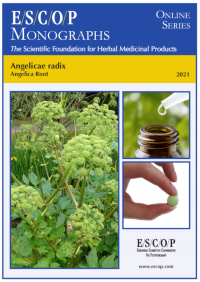Angelicae radix
Angelica root
Angelica archangelica L. (syn. A. officinalis Hoffm.)
Published 2021
Format: PDF

ESCOP monographs The Scientific Foundation for Herbal Medicinal Products. Online series. Angelicae radix (Angelica root). Exeter: ESCOP; 2021.
- Download monograph (15 Euro)
- Online viewing (30 Euro por año, gratis para los socios de SEFIT)
SUMMARY
The herbal monograph selects and summarizes scientific studies and
textbooks regarding efficacy, dosage, and safety to support the
therapeutic uses of angelica root.
This herbal drug by definition consists of the dried rhizome and root of Angelica archangelica L. (syn. A. officinalis Hoffm.).
Studies with its main characteristic constituents, the essential oil, containing mainly monoterpenes and smaller amounts of sesquiterpenes, coumarins such as prenylcoumarins and furanocoumarins, as well as various phenolic acids are included.
The therapeutic indications are dyspeptic complaints such as mild gastrointestinal spasms, sluggish digestion, flatulence, feeling of fullness, loss of appetite, and bronchitis.
Administration of angelica root addresses posology; its duration of use; contra-indications; special warnings; special precautions for use; interactions with other medicinal products; other forms of interaction; in pregnancy and lactation; its effects on the ability to drive; undesirable effects; overdose.
In vitro experiments with angelica root demonstrated spasmolytic, calcium-blocking, anti-inflammatory, antimicrobial, antiviral, and cytotoxic activities. In vivo experiments with angelica root or its extracts, demonstrated gastrointestinal, hepatoprotective, anti-inflammatory, analgesic, sedative, anxiolytic, anticonvulsant, and antitumour properties.
No clinical data were available for mono-preparations of angelica root.
Preclinical safety data were assessed in toxicity studies.
Safety data from randomized, controlled studies, showed that angelica root was safe when used in an herbal combination.
The selection of literature cited in the monograph is aimed at bringing together relevant information about the possible physiological roles of angelica root and its major constituents.
KEYWORDS
- Angelicae radix
- Angelica root
- Angelica archangelica L. (syn. A. officinalis Hoffm.)
- Digestive disorders
- Respiratory disorders
- Dyspeptic complaints, such as mild gastrointestinal spasms, sluggish digestion, flatulence, feeling of fullness, loss of appetite
- Bronchitis
Reference: European Scientific Cooperative on Phytotherapy. ESCOP monographs The Scientific Foundation for Herbal Medicinal Products. Online series. Angelicae radix (Angelica root). Exeter: ESCOP; 2021.
